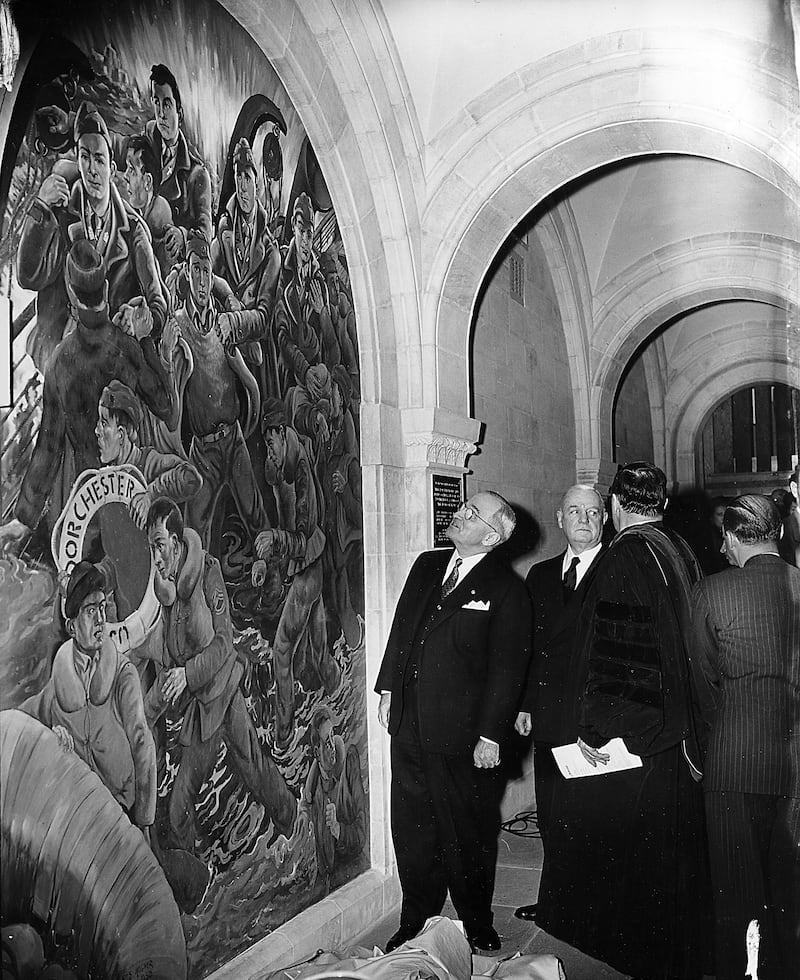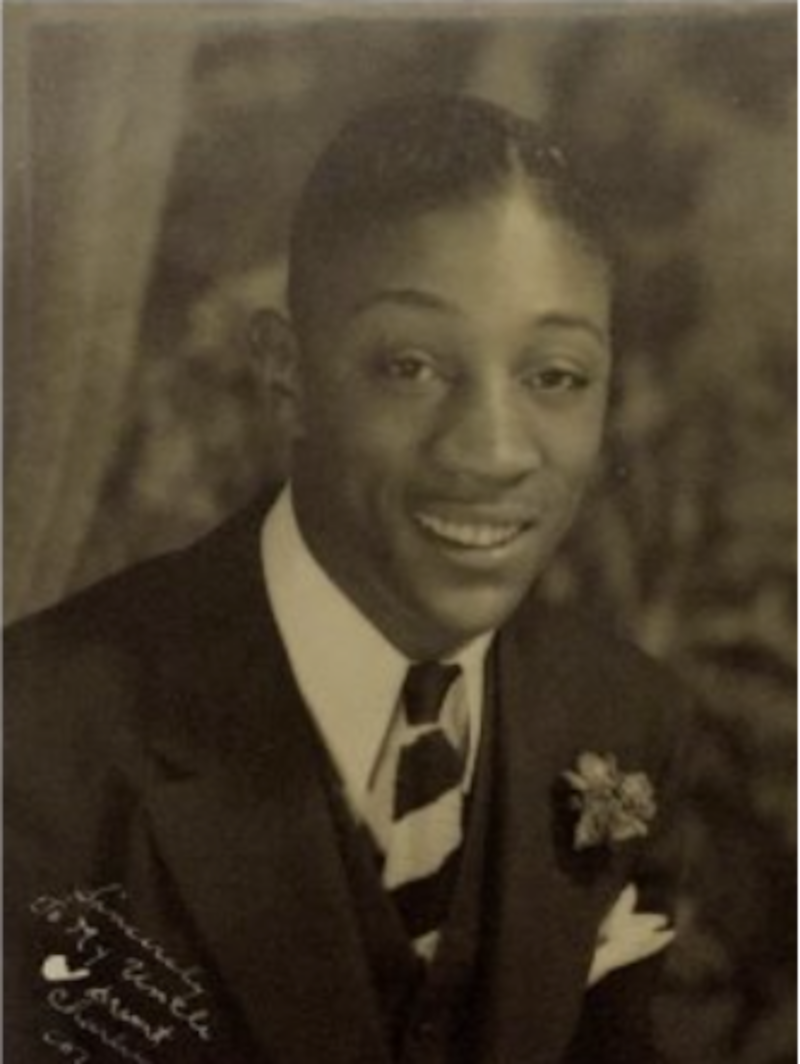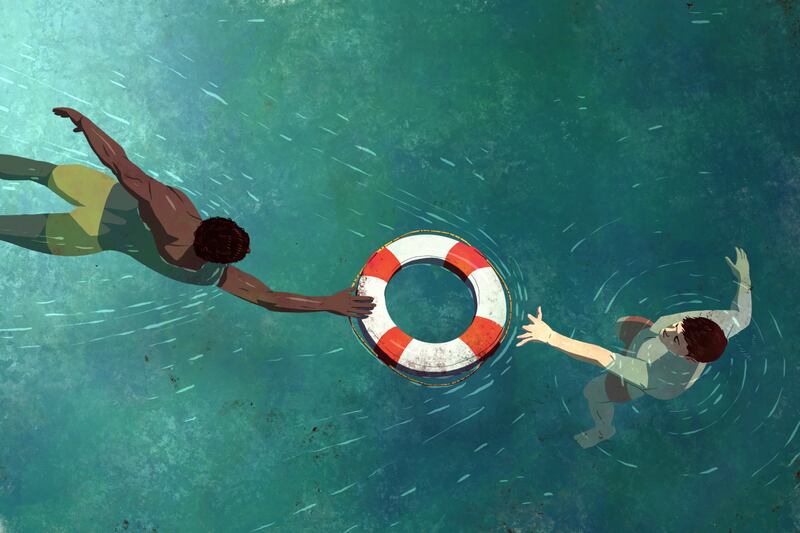This month marks the 80th anniversary of the sinking of the Dorchester, a U.S. Army transport ship, by a Nazi U-boat during World War II. It was the worst troop transport disaster our nation suffered during the war. But it is remembered for something far more important: four chaplains and a Black cook sacrificed themselves to save hundreds of soldiers who were very different from them, religiously and racially.
The chaplains were Clark Poling, Alexander Goode, John Washington and George Fox. Each was of a different faith. The Black Coast Guardsman was Charles W. David Jr., who served during a time when the Coast Guard would not allow him to be anything other than a cook, simply because of his race.
I learned of the Dorchester tragedy more than 15 years ago when a colleague showed me a stamp from the 1940s commemorating the sacrifices made that night. He briefly told me the story. The tale resonated with me, as it does with most people. I vowed then, on the spot, that if ever given the opportunity, I would bring it to life for a new generation.
But here’s the thing. It has taken me 15 years to articulate why the story resonates with me. I wrote a book about the disaster. I spent more hours than I remember researching it, traveling around the country, digging through the records of archives, drafting pages while crammed into economy-class seats on airplanes, interviewing experts on submarines and U-boats and chaplains, tracking down family members and learning stories that were so important to them, listening to interviews of survivors, digitizing those interviews and trying to tell this story in a way that honored not just the men who sacrificed themselves but their families who lost them.
And all the while, I could not articulate why I felt compelled to write it. I tried, of course, but I never felt I had properly stated the reason.
Even after the book was published and I had done dozens of TV, radio, podcast and news interviews, I struggled to express it. But the answer has finally come to me. The story of these five men is so powerful because it captures a paradox that many of us know deep down but that we have either forgotten or lost sight of in the fog of this very busy world. What is a paradox? An unexpected but inevitable outcome from a particular action. An outcome that seems completely illogical, yet occurs nonetheless.
Nearly every religious tradition and philosophy has discovered and taught this paradox. It is wisdom passed down through the ages across many cultures and societies. That it has withstood the tests of time and ideological division is a testament, in my mind at least, of its truthfulness.
And it is this: To find ourselves, to truly heal ourselves, we must lose ourselves in the service of others — even, and perhaps especially, the service of those who are different from us.

One of the defining characteristics of our age, at least in the Western world, is that people are trying to find themselves. They are trying to improve themselves. They are seeking self-care. They are seeking much-needed therapy, through professionals and through any number of resources online, through smartphones and apps and as many likes on social media as their selfies and memes can produce.
We live in an era of increasing individualism, where our entire culture is encouraging us to live our best lives by seeking after and developing our authentic selves. “Pursuit of the self” defines modern society. Along the way, we are increasingly told that the only truth that matters is the truth we create for ourselves. Whole industries have ballooned up around self-improvement, with no shortage of advice. It seems, more than ever before, human beings are focused on becoming their best selves.
But what do we have to show for all this focus on the self? What fruits has it given us? We are seeing mental health crises increasing at a dramatic pace, especially among young people. Depression, anxiety and suicidality are rampant. Polarization sits at some of the highest levels in history. Trust in many of our institutions is eroding. Too many of us cannot even talk to each other. As counterintuitive as it may seem, it appears that a focus on taking care of and promoting ourselves is doing very little to help individuals or our society.
So I return to the paradox. We see it in so many traditions. Christ taught, “Whosoever will lose his life for my sake shall find it.” And Christians lose themselves for his sake by serving the “least of these” among us. The ancient Stoic philosopher Seneca wrote, “Nor can anyone live happily who has only himself in view, who turns everything to his own advantage; you ought to live for the other fellow, if you want to live for yourself.”
I don’t pretend to be a psychologist. I don’t mean to discourage anyone from seeking the help they need in their lives, nor do I mean to denigrate any of the wonderful professionals who are doing so much to help people who are struggling.
But I do know that, for me, the reason the story of these five men and their families resonates so much is because it reflects this paradoxical truth humanity has known for so long. We find ourselves by losing ourselves in uplifting others. The chaplains and Charles David were asked to give their whole lives. Their sweet families, like those of so many others, were asked to live on without their loved ones.
Most of us will never be asked to do that.
But we can lose ourselves. We can lose ourselves by loving our families more than our ambitions. We can lose ourselves by learning the needs of our neighbors. We can lose ourselves by fighting less on Twitter with strangers and spending a little more time with our family, friends and people in our community. We can lose ourselves by helping our co-workers receive praise, rather than seeking it for ourselves. We can spend a little less time focused on how other people should change, and more on simply helping anyone in our circle who needs it.

Spouses can spend more time with each other. Parents can give more time to their children and less to their phones. Children can serve their parents and their siblings. We can all offer to help more in our families, our neighborhoods, our churches, our schools, in charitable organizations or in the military. We can spend less time posting or reading online about the world’s problems and more time actually engaged with human beings around us.
My hope is that we won’t just commemorate that tragic yet heroic night on the frozen Atlantic. To echo Abraham Lincoln, “It is altogether fitting and proper that we should do this.” But it is more appropriate that we try to emulate in our own lives the spirit that those good men showed that night.
“It is for us the living,” Lincoln said at Gettysburg, “to be dedicated here to the unfinished work which they ... so nobly advanced ... that from these honored dead we take increased devotion to that cause for which they gave the last full measure of devotion — that we here highly resolve that these dead shall not have died in vain.”
May we let go of ourselves by being a little more forgiving. May we look to uplift others instead of ourselves — not through quick social media posts but through actual helpfulness to real human beings in our lives, perhaps especially those with whom we disagree. That is how we can heal ourselves and our society.
To quote Seneca again: “It is required of a man that he should benefit his fellow-men —many if he can; if not, a few; if not a few, those who are nearest ... For when he renders himself useful to others, he engages in public affairs.”
If we would change the world, may we honor the memories of these immortal men and their families by following their examples — today, and every day.
Steven T. Collis is a law professor at the University of Texas-Austin and the author of “The Immortals: The World War II Story of Five Fearless Heroes, the Sinking of the Dorchester, and an Awe-Inspiring Rescue.”


